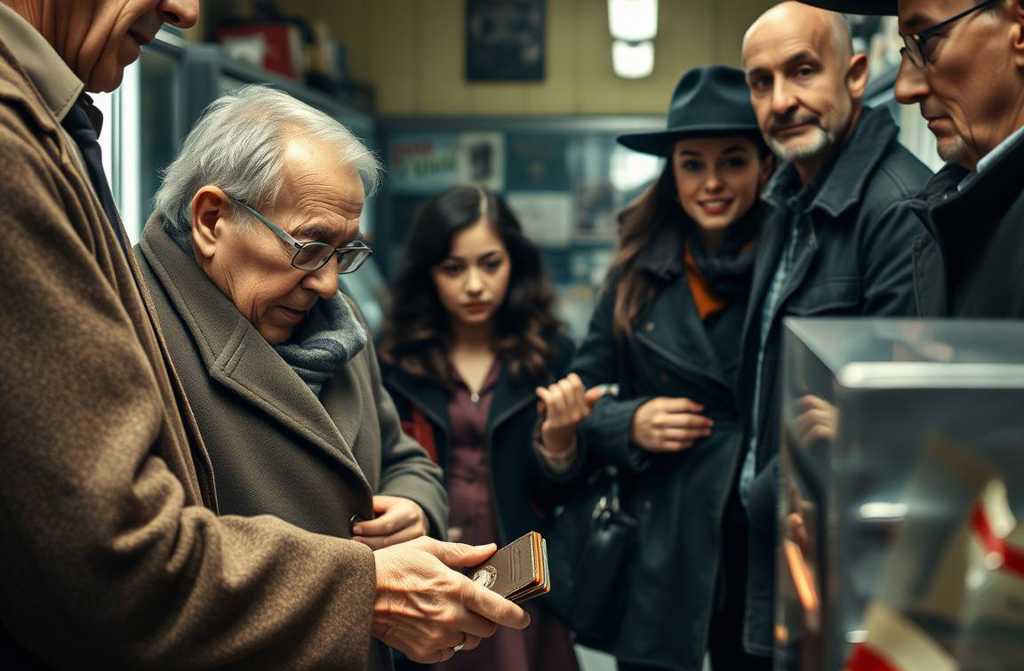Arthur Whitmore hadnt felt right since morning. His head spun strangely, and every now and then, his vision blurred. Hed half hoped he wouldnt wake up at all, but his stubborn body refused to give in. And Dorothy wasnt with him anymore He let out a heavy sigh.
The queue at the supermarket checkout was growing, and Arthur grew impatient as the woman ahead of him took her time. But shepolished, elegant, even beautifulstood perfectly calm. Her daughter had asked for oat milk, so shed stopped in. A bittersweet smile touched her lips. *Dont lie to yourselfyou didnt want to go home.* Lately, home had become unbearably cold. Not the decortheyd built a lovely life, earned well, bought a stunning flat in Chelsea But theyd stopped talking. Yet there was a time when she and Ben had laughed like that young couple behind her, whispering and giggling.
The scruffy lad with a childish tuft of hair at his neck nuzzled his girlfriend. Shed have been pretty if not for the all-black rebellionsmudged eyeliner, dark nails, shaved temple, lips stained like ink. But her beau didnt care; he gazed at her adoringly, breaking off bits of fresh sourdough for her, stars in his eyes.
Arthur huffed. No staff in sight, yet the queue dragged. A businessman with a briefcase, yoghurt, and pastries tapped his foot impatientlylast in line, sighing, checking his watch.
Arthur noticed it all from the corner of his eye, an old army habit. *Scouts instincts.* But his hands fumbled, struggling with the worn clasp of his wallet, coins slipping through his fingers. The cashier snapped at the “slow old codger,” grumbling about time-wasters.
Arthur hurried offnever mind the bread, ridiculously expensive now anyway, some organic spelt nonsense. He smirked bitterly. He and Dorothy had lived modestly. Barely scraped by, really. Their pensions barely covered basics, and the flat had started falling apartleaky taps, burst pipes. Expenses. At his age, he couldnt fix it himself. Eighty next year. And Dorothy she hadnt made it.
Theyd met during the war. Dorothy had been just a girl, lying about her age to enlist. A nurse, fearless, crawling through battlefields, dragging wounded soldiers to safety. Arthur had been a scout. Near the wars end, hed been captured, unconscious, no papersscouts never carried identification. His unit was wiped out. He never knew who pulled him out or how he survived the POW camp. When liberation came, he was half-dead. Dorothy saved him, nursed him back, even slipped him a dead soldiers papers. *Clever girl, his Dorothy.*
No childrenGod hadnt blessed them. Dorothys health never recovered after the war. Theyd lived quietly, worked hard, and when Dorothy fell ill in the seventies, Israel was their only hope for treatment. Theyd agonised over the documents, sleepless nights, but they went. Spent their lives afraid. Never made waves.
Even in England, it wasnt easy. Dorothy recovered, but survivors werent always welcomed. And being Russian didnt help. A hard life. And after Dorothy passed, his days blurred into grey. Bread and milk were enoughwhat more did an old man need?
At the till, Arthur finally stopped fiddling with his meagre coins, muttered an apology, and slumped to the floor.
The elegant woman was the first to rush over, cradling his head. The scruffy lad rolled up his jacket as a pillow; his girlfriend dialled 999. The businessman fanned him with his hat.
*Funny, isnt it?* A small, often prickly country, full of “bloody immigrants,” yet no ones sorrow went unnoticed
By the time paramedics arrived, the strangers had bondedsmiles warmer, eyes kinder.
Emma, a doctor, took charge. Arthur had forgotten his pills, but he stabilised. She noted his details and, out of habit, checked on him the next day. He was well enough to go homebut whod take him?
Emma drove Arthur back herself. She couldnt say why the frail old man had gripped her heart. But stepping into his flat horrified her. A bucket in the kitchen caught drips from the ceiling. The image haunted hera helpless old man in a crumbling home.
The next evening, Emma knocked firmly. No answer, but laughter spilled from inside. She stepped in, stunned. Arthur sat beaming in his armchair, while the young couple from the shop knelt before him, hypnotised, like Mowglis bandar-log entranced by Kaa.
“Emma, dear, come in!” Arthur tried gallantly to offer his seat.
They started with small fixespaint, a new tap. But the old building had other plans. Walls crumbled; repairs snowballed.
Arthur protestedhe needed nothing!but he hadnt felt so alive in years. Guilty, yes, but alsojoy.
The “bandar-log” worked tirelessly with Emma, hauling rubbish, scrubbing. The hatted businessman, a neighbour, turned out to be a decent plasterer. He bought supplies himself, worked steadily.
Then, mid-chaos, Emmas Ben appeared.
“Blimey, whatve you lot done?”
Emma gaped. Shed mentioned Arthur, the repairs but shed assumed Ben hadnt listened. Lately, hed been distant, buried in work.
“RightJosh, take notes!”
Ben ran a tech firm, wore tailored suits. But now he rolled up his sleeves, checked wiring, damp under the bed. (Hed been handy once.)
He rallied his team: *Veteran. Alone. Needs help.*
Emma spread the word. So did the hatted man. The young couple posted online.
First came the facilities teamwalls painted, doors replaced in a flash. The directors nephew brought custom windows”Client cancelled. God bless the old soldier.” Neighbours donated spare tiles. Strangers brought kitchen units. *Howd they even hear?*
Bit by bit, the whole neighbourhood chipped in.
And Emmashe glowed. Took leave for the first time in years. Ben raced over daily, hammering, joking, *splashing paint on her on purpose.* Even stole a kiss. Two.
The “bandar-log” grew up. The girl wiped off her black makeup, revealing freckles and a sweet face. The lad, too exhausted for rebellion, found purpose. Bothunloved as kidsadored each other. And Arthur, whod shown them what family meant.
Arthur watched them, murmuring, eyeing his restored flat *Whats he planning?*
The yoghurt businessman was a chess whiz. They played nightly, debating politics respectfully. Andluckilyhe worked for the DWP. Arthurs pension was sorted properly.
The youngsters dug deeperarchives, war records. Months of emails, rejections until they restored Arthurs true name, his medals.
“Emmadont go overboard!” Ben laughed, fitting the new tap. “Next month, youll have us rebuilding houses in Botswana!”
A tea towel sailed at him, catching the light like Scarletts sail in *Gone With the Wind.*
Outside, grocers bickered. Kids shrieked. Cars honked.
But in the old soldiers flat, lives collided, physics bent, and paths reroutedall hurtling forward, anew.
Because in this country, no sorrow goes unwitnessed.







